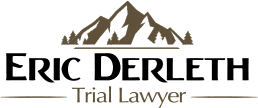Menu




Riding a motorcycle in traffic puts you at risk, no matter how attentive and cautious you are. Most motorcyclists take every possible precaution to avoid becoming an accident victim. Unfortunately, no matter what precautions you take, you can't control other people on the road.
Regardless of how your accident happened, if you were injured in a motorcycle accident due to someone else's careless actions, you may be entitled to compensation. Protect your rights by consulting an experienced motorcycle accident attorney.
If you've been injured in a motorcycle accident that wasn't your fault, contact attorney Eric Derleth right away. With over 25 years of experience in personal injury law, Eric is an effective advocate both in settlement negotiations and at trial—that’s why he’s known as the Trial Guy. With Eric pursuing your claim, you can concentrate on recovering from your injuries. From his office in Soldotna, he serves clients throughout Alaska, including Anchorage, Palmer/Wasilla, Juneau, and the Kenai Peninsula.
We invite you to call at 907-262-9164 or contact us now to schedule a free, confidential consultation to get your questions answered.
If you are involved in a motorcycle collision, your first priority must be to get to safety. Then, you should do the following:
Eighty percent of all motorcycle accidents result in some type of injury—and nearly half of all motorcycle accidents involving other vehicles happen at intersections. Motorcycle accidents have a higher injury rate than automobile accidents, partly because motorcyclists don’t have seatbelts, airbags, or the protective structure of an automobile to keep them safe.
Motorcycle accidents may happen when:
Two common injuries associated with motorcycle accidents are:
If you are injured and your motorcycle damaged as a result of someone else’s careless or reckless driving, an experienced motorcycle accident attorney can ensure you receive all the compensation to which you are entitled.
Like other types of personal injury claims, motorcycle accident claims depend on liability. In Alaska, you need not prove that the other person was entirely at fault for the accident. In order to pursue compensation for a car accident in Alaska, you must show the following:
Under Alaska's rule of comparative fault, you can still recover compensation for your damages if you are partially liable for the accident. However, your total recovery amount will be reduced by your at-fault percentage. The process of determining liability can be complex, and insurance companies will often do everything they can to devalue or deny your claim.
Regardless of what they say or how they act, the other driver’s insurance company is not on your side. You do not have to provide a statement to anyone other than your own insurer and the police at the scene. To protect your rights, work with an experienced motorcycle accident attorney whose job it is to represent your interests.
Remember that insurance companies’ goal is to pay out as little in claims as possible. They may try to convince you you don’t need an attorney, in part because they know having an attorney is likely to increase the amount paid on your claim. Insurance companies also know that if they can speak with you directly, you may inadvertently say something that will damage your claim.
The best way to negotiate with an insurance company after a motorcycle accident is to let your attorney do the talking. An experienced injury attorney is familiar with insurers’ tactics to reduce or deny claims, and can negotiate a much more favorable settlement than you could likely achieve on your own.
If you or a loved one has been injured in a motorcycle accident in Alaska, having the right attorney can make a big difference to the outcome of your injury claim. Attorney Eric Derleth has over 25 years of experience successfully handling motorcycle accident claims in Anchorage, Mat-Su, Juneau, and throughout the Kenai Peninsula and the state.
As with all injury cases, you have only a limited amount of time to file a claim. Once the statute of limitations has passed, your chance to make a claim is gone forever, no matter how severe your injury. To protect yourself and learn more about Alaska motorcycle accidents and how an attorney can help you, contact the Trial Guy for a free, confidential, no-obligation consultation.
© 2024 Eric Derleth - Trial Lawyer, Inc.|Legal Disclaimer|Privacy Policy